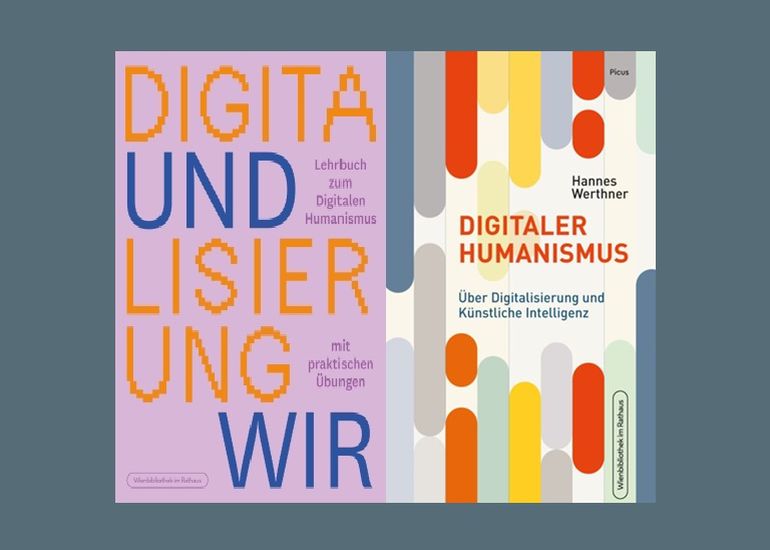New Books on Digital Humanism
The Digital Humanism Initiative has published two new books in cooperation with the Vienna City Library. Join the public events on January 20 and 24.
Digitalization and Us
Textbook on digital humanism with practical exercises. Digital humanism as a model for the future
A new standard work for use at upper secondary level and in adult education institutions.
This textbook presents selected focus topics of digitalization. Twelve chapters are dedicated to digital transformation, digital humanism, the history of data processing and an introduction to artificial intelligence (AI). The need to protect privacy and regulate AI is highlighted, as are the effects of data-intensive AI on people and the environment. In the context of human-centered system development based on philosophical principles, as aspired to by digital humanism, this textbook discusses recommendation systems and their influence on plurality and fairness, prejudices and bias on the web as well as the problems that can arise from algorithmic content moderation.
The textbook can be ordered at https://www.residenzverlag.com/buch/digitalisierung-und-wir (in German).
Editors:
Digital Humanism - On Digitalization and Artificial Intelligence
Information technology is changing us, our society, our world, from the individual level to geopolitical power games. It also influences how we see and think about the world. This change has happened in an extremely short period of time for human history and at a very high speed. And it is continuing - with artificial intelligence currently being the most prominent example. IT has the potential to help solve the world’s crises and make our world a better place, but at the same time it is part of the problem (for some, it is even the cause).
Hannes Werthner addresses the topic of advancing digitalization (including artificial intelligence), describes the enormous opportunities that arise from it and also analyses its serious shortcomings.
His concept of digital humanism sees itself as a response to this situation and - in addition to analyzing the interaction between human and machine - aims to shape and regulate digital technologies through active influence so that they are used for the benefit of human and nature.
The book will be available from February 2025 at https://www.picus.at/produkt/digitaler-humanismus-2/ (in German).
Book Presentations
You are kindly invited to join the book presentations:
- January 20, 2025 - Digitalization and Us
- January 24, 2025 - Digital Humanism - On Digitalization and Artificial Intelligence


